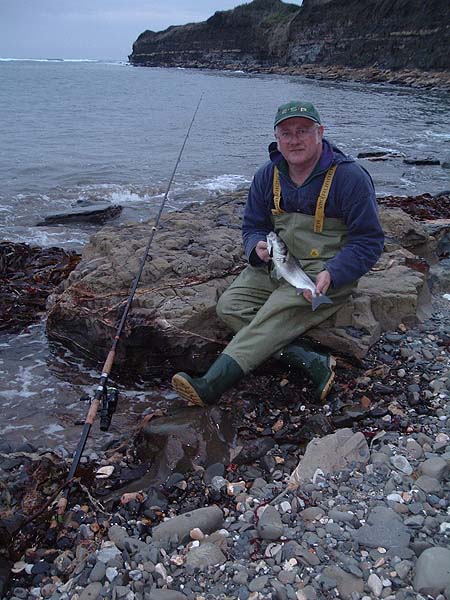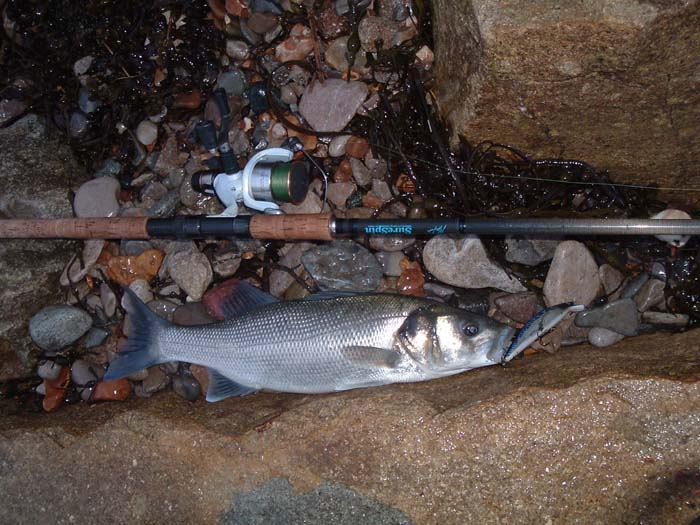 '
'Information Page.
Lure fishing history
It's so long since I wrote this piece that it is practically an historic document. Anyway, I think it's interesting to note how things have changed in the last thirty years or so. I've worded it exactly as I wrote it so you'll have to make allowances for some of the comments. Anyway, here we go --->
I hope that this piece is now redundant. When I wrote it, fifteen years ago (NOW THIRTY), lure fishing was already catching on – at least along the south coast. Now you are much more likely to see someone with a spinning rod or even a fly rod than a bottom fisher, at least along certain stretches of coast. Anyway – here’s a bit of a blast from the past!
As you will be only too well aware the weather this spring was rotten, so when the sun shone for a couple of days in late May I was soon thinking about a spot of fishing. As I peered out of the window to see what the wind was doing, the phone rang. Harry had read my mind and suggested a couple of hours spinning at Worbarrow Bay - a gravel beach only twenty minutes from home. I grabbed the rod and the bag of lures, put on my boots and jacket (there was still a cool easterly breeze) and walked out of the house to wait for my lift.
We drove into the car park, at the deserted 'ghost village' of Tyneham, just as most of the sun worshippers were leaving. As we unloaded the fishing gear one bloke, seeing the rods, wound down his car window and asked "Where are you going to fish?" I must have looked a bit taken aback because he went on "Is there a pond or river near here?" Then we twigged - because of the carbon fibre carp rods, which we use for spinning, the chap thought that we were after "freshwater fish." We replied that it was our intention to fish from the beach. Still clearly a bit puzzled the enquirer said that he had "never seen anything but beachcasters used for sea angling!"
I suppose we should not have been surprised that the holidaymaker thought that sea fishing was ALWAYS done with heavy tackle. In fact, since a number of well known sea angling writers STILL seem to see little merit in suitably light rods and lines and even less in artificial lures, the question should have been expected. Of course most critics of spinning gear have generally done little more than feathering for mackerel or, at best, "Redgilling" for pollack and they rarely appreciate even the basics, let alone the subtleties of lure fishing. Despite this "head in the sand" attitude, for many of the people who fish the Purbeck coastline these days a 'spinning' rod is almost a necessity.
Of course if you "spin" in time-honoured fashion by using hefty "pike" rods, ounces of lead, big hooks adorned with feathers and tinsel or heavy spoons and the like then you ARE unlikely to catch anything but the more suicidal species. However there IS another approach - and it DOES work! It is no accident that lure fishing is the fastest growing branch of the sport in this country (Lure Anglers' Society of G.B. 1994). Nor should it be surprising that the world famous lure makers "RAPALA" have just commissioned a lure fishing book (which includes a section on salt water shore fishing) specifically for the British market.
Of course, with regard to sea angling, there ARE some limits to the use of lures. In general (but not exclusively) the fish which we take on artificials from the south and west coasts bite best in the period from May to October. Also, there is not much point trying to catch big fish if there are none there to be caught but this is not much of a handicap. It is a FACT that bass are regularly caught on lures from Anglesey to Suffolk; mullet are similarly distributed, in estuaries and on the open shore and, according to the species which is present, readily take spinners or flies. Big wrasse grab plugs almost too keenly at times. Pollack are widespread and active predators and along the cooler northern shores coalfish are just as keen to absorb the Redgill, spoon or plug. Mackerel, garfish, codling, gurnard, flounder and even sandeels present their particular challenges to the lure enthusiast - so don't be put off by dismal Jimmies who are too set in their ways to give spinning a fair trial.
Enough of the hard sell! Let's return to Worbarrow Bay - I plugged the full length of the shingle with a large buoyant plug while Harry fished a small silver spoon. He had three mackerel and I had a two pound bass which was returned. Nothing too exciting there I suppose! It IS significant that the bass was taken on the big plug and the mackerel on the little spoon. I should say that other anglers, using bait, were catching nothing in the calm clear water. Our fish were all taken on eight pound lines and each one scrapped all the way to the beach. We saw lots of mullet feeding at the surface but had no suitable gear to fish for them.
On one evening, during spring tides of the previous week, we fished off the rocks and while this time Harry had one missed bite on a small balsa plug bait I landed three mullet (two five pounders and a four pounder) on "trout" fly tackle. I used a little ethafoam fly fished right in the surface film only three or four yards out. In the same session I hooked and lost over a dozen other mullet, not solely through incompetence but because they fight so bloody hard. Some of the lost fish were played for over five minutes before they shed the size ten hook.
I know that this may sound like fantasy to many sea anglers but, just to prove that I'm not making it up, there were several witnesses to the catch (and the losses). My friends Derek Edmonds and his wife were bait fishing nearby and two other mates Alan Sim and 'Kiwi' were also mullet fishing alongside. Incidentally, Alan told me of a mouthwatering day's fishing a few days earlier when he landed three salmon (on lures), a trout and an eight pound bass (on bait) in the same day.
Well that's my annual plea for anglers to consider the option of using artificial lures in the sea. Just remember that the above sessions are not exceptional. I am always ready to leger, floatfish, paternoster, freeline or use any of the conventional methods. I frequently do all of these things with baits ranging from tiny maggots, worms and bits of bread to squid, mackerel and crab. I cannot honestly say that I have a favourite fish, a favourite method or a favourite bait but I DO KNOW FOR CERTAIN that I would catch a LOT less fish if I never used artificials.
So - there you have it. It really does sound old fashioned now doesn't it? Eight pound nylon and carp rods have long been supplanted by custom made spinning rods and 20-30lb braid. Bass and mullet are caught all the way from the West coast of Scotland to Northumberland. My personal bass season often extends from March to November. Poppers and soft plastics have been added to the list of essential lures and so on. Nevertheless, the mullet fight just as hard and the trudge along the shingle doesn't get any easier but that, as they say, is fishing.>
If you have any comments or questions about fish, methods, tactics or 'what have you.'get in touch with me by sending an E-MAIL to - docladle@hotmail.com
An April bass.
 '
'A November bass.
 '
'